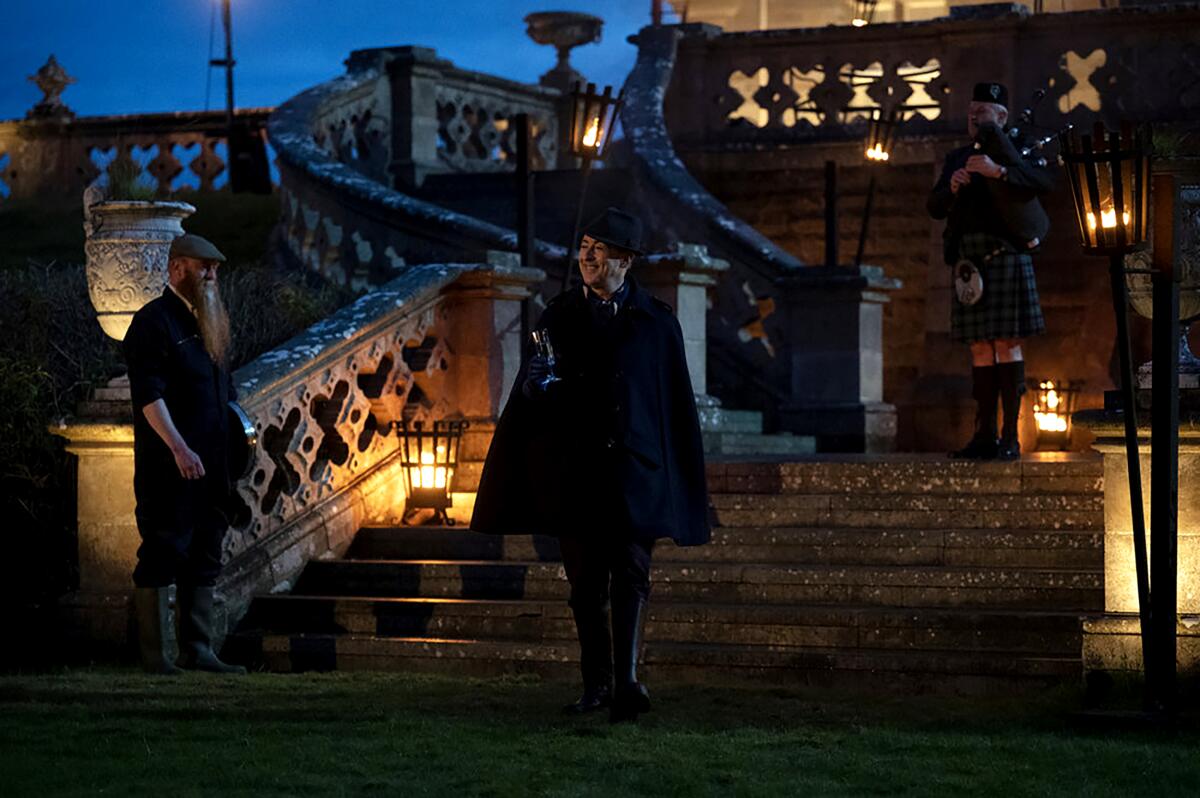Alan Cumming calls them traitors -- and they could win money for it

- Share via
The reality competition programs that pepper networks and streamers are often just elaborate versions of games you might play on Saturday nights with your friends. And like in any game, someone can mess it up. Someone can cheat. Someone can quit. Things can always go wrong. And for the inaugural American season of “The Traitors,” one of the most stressful moments, where almost the entire show could have fallen apart, occurred in the very first episode.
Set in a castle in the Scottish Highlands and adapted from the original Dutch series, the breakout Peacock version features 20 contestants who are quickly designated as either traitors or faithfuls. The latter spend the game attempting to weed out the traitors for a chance at winning $250,000. If a traitor makes it to the end without getting discovered, they steal the prize money. At the end of every day of filming, the faithfuls are given an opportunity to vote out anyone they believe is a traitor (they are often wrong) and the traitors are allowed to “murder” someone to eliminate their competition.
But before that could begin, the show hinged on its charismatic host, Alan Cumming, selecting the three secret traitors around a table of blindfolded contestants.
“I went round that table many, many times,” Cumming says. “Of course, they were all really hyper-listening, and they talked about that later, but I would trick them by stopping and starting again and going in different directions. And we knew that as soon as you put a blindfold on someone, all their other senses become hyper-aware.”
Executive producer Toni Ireland‘s biggest fear was a contestant sneaking a look under their blindfold and discovering whom Alan chose — so much so that she made sure to check every mask herself. She notes, “A lot of the team made shows like ‘The Circle’ before where we have a catfish, and we need to keep the catfish secret. We had a bit of training in that, but nothing can prepare you for this. Even when I used to go in and brief [‘The Traitor’ contestants] on a certain rule, I would just be reading my paper and thinking, ‘Don’t look anywhere,’ because I didn’t want to give anything away.’”
Unlike the original incarnation, which featured only celebrities, and a UK version that cast everyday people, the U.S. franchise went with a mix of newcomers alongside recognizable Bravo reality veterans and familiar faces from “Big Brother,” “Survivor” and “The Bachelorette.” Executive producer Mike Cotton reveals that originally, his team pitched a civilian cast, but the network proposed going in a different direction.
Cotton notes, “People have a preconception of celebrities, don’t they? The way that they behaved in past shows means that how they’re viewed might be different from how it’s viewed if you’re a regular civilian. How does someone approach the game when no one knows anything about them versus someone that’s coming in with a preexisting reputation? It was definitely an experiment and new because it hadn’t been done anywhere else.”
As the show’s emcee, Cumming is playing a heightened version of what he refers to as “an imaginary me.” The producers specifically recruited him because they wanted the host role to be different and more theatrical than viewers expected. The Tony and Emmy Award winner was responsible for introducing the participants to the challenges and, often, managing their participation in the daily round table.
“Sometimes my job was to get them going, because sometimes they’re all in a bad mood and nobody wanted to talk,” Cumming says. “So, yeah, it was half monitoring, half cajoling and then reprimanding. Often, they were sort of speaking to each other when we were supposed to be voting and I have to intervene, like bad daddy.”
In a series that was full of organic surprises, the final endgame episode was one of the more shocking in recent reality competition show history. At almost the last minute, a contestant with a substantial private business dropped out of the competition after he was subtly called out for his wealth by one of his competitors. Cumming, who was part of the scene, says production had to cut away from him because his poker face left him, and he was “absolutely gobsmacked.”
“My mouth was agape,” Cumming recalls. “There was this silence over my earpiece. Then all of a sudden, the scrambling and [then] ‘Let it ride, let it ride.’ I mean, it was so crazy it felt like the whole game was up in jeopardy. Nobody thought this would happen. You saw someone calling out someone else’s privilege. And I thought that was kind of interesting, actually. It’s amazing we have moments like that, that come out of a game like this.”
Cumming has had a long career in television and is often in the public eye, so much so that it’s a rare occurrence that anyone in his circle reaches out about seeing him on TV, not even his mother. When the series dropped, the “Schmigadoon!” star knew this show was atypical, because his phone immediately started blowing up.
“What’s great is whenever anyone leaves a message and say, ‘Oh, my God, I’m obsessed with “The Traitors,’’’ I leave a voice memo and I go, to whoever it is, ‘You’ve received the most votes and are banished from the games. Please come forward to the circle.’ That’s all I say, and I just get these screaming messages back. It’s great to have a catchphrase.”
More to Read
Sign up for The Envelope
Get exclusive awards season news, in-depth interviews and columnist Glenn Whipp’s must-read analysis straight to your inbox.
You may occasionally receive promotional content from the Los Angeles Times.










